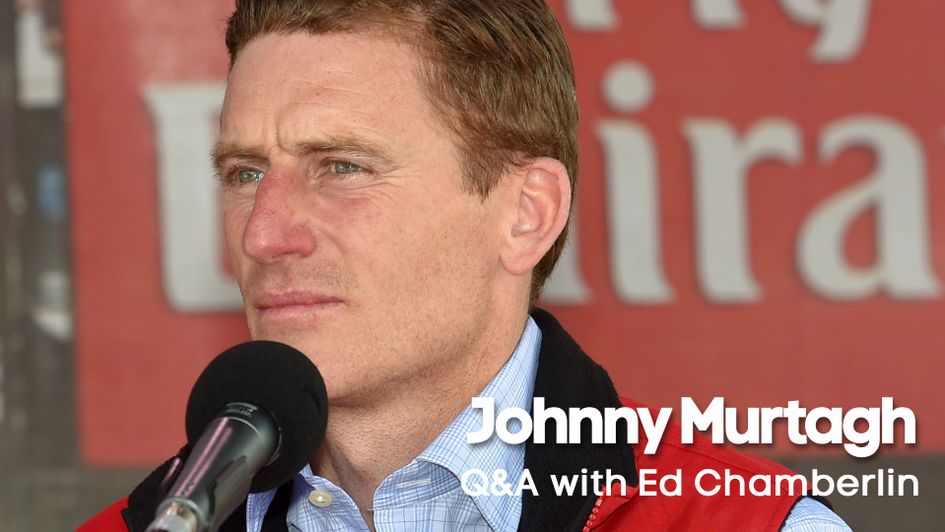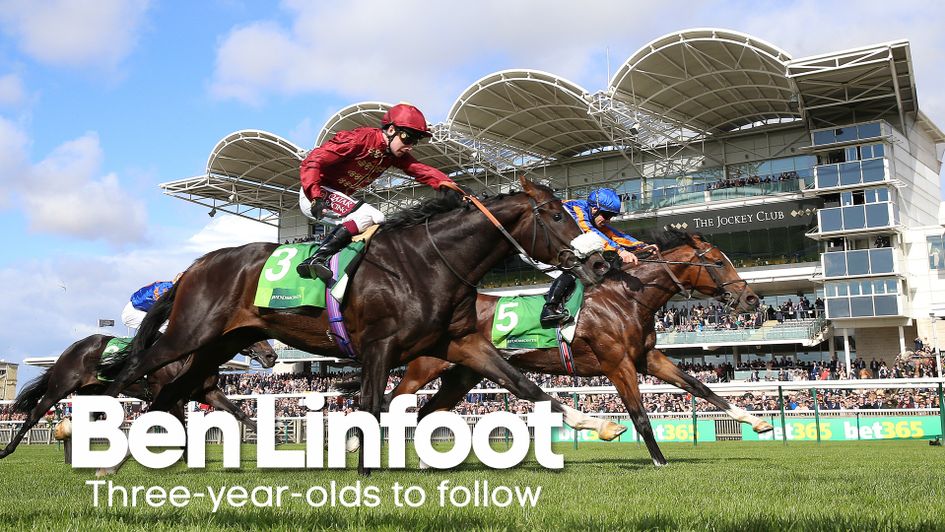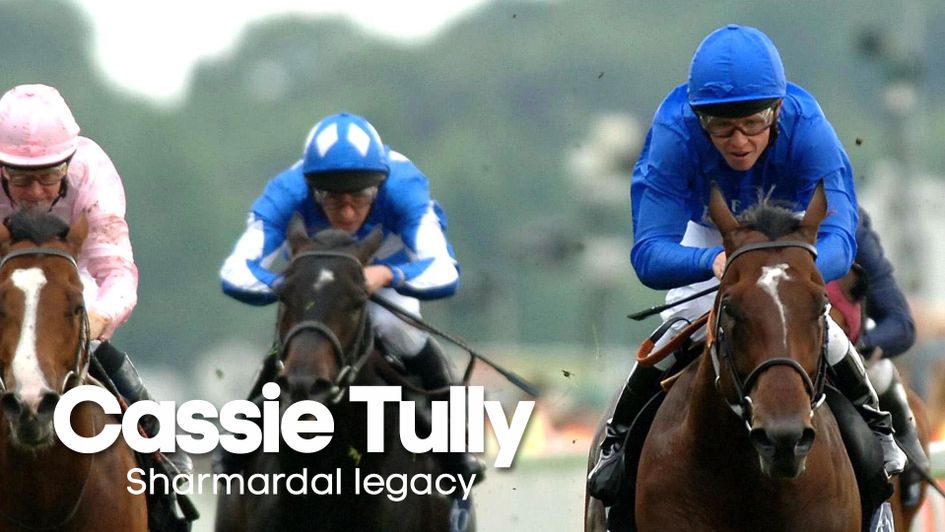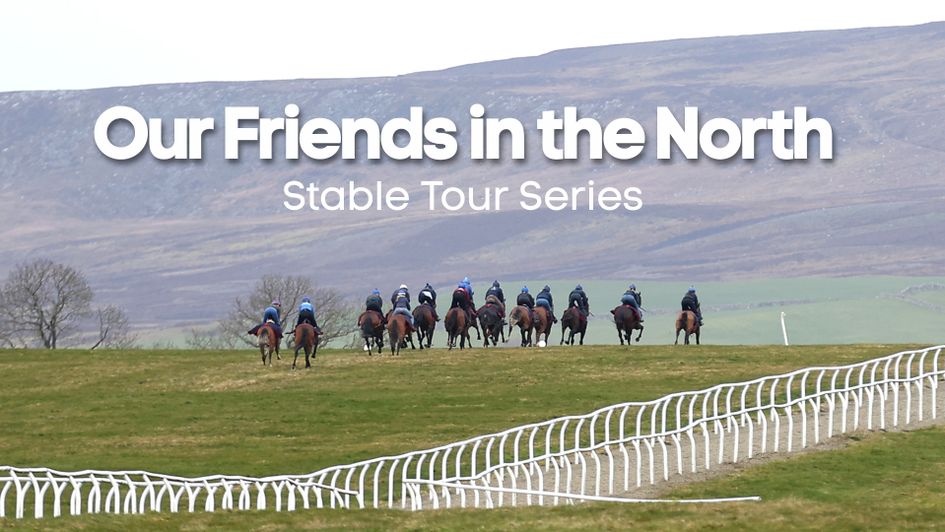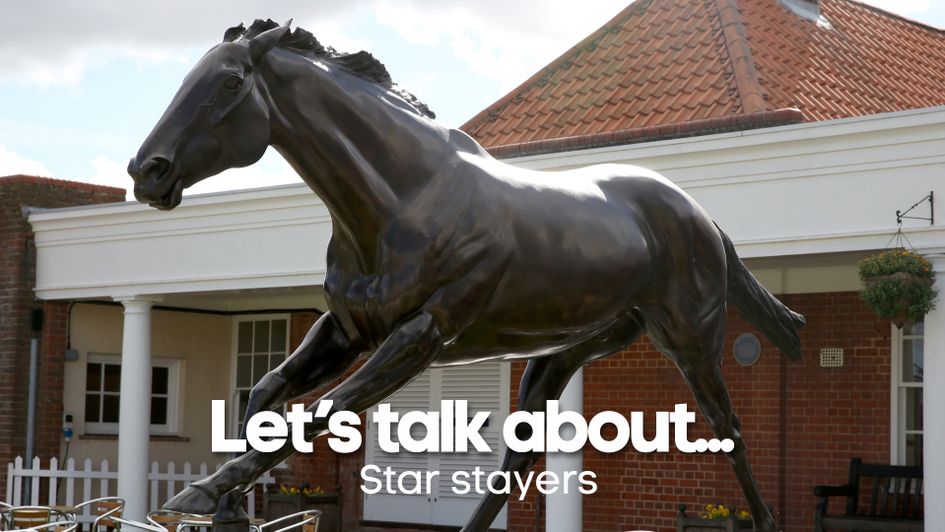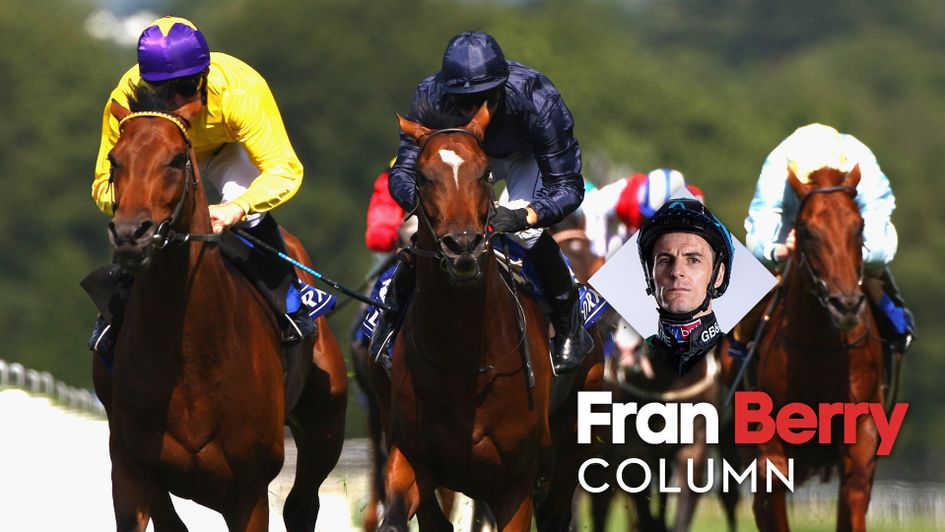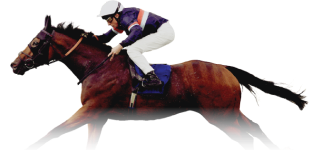Ed Chamberlin speaks to Johnny Murtagh about life in lockdown, the best horses he rode, the transition to becoming a trainer and much more.
Ed Chamberlin: It’s a difficult time for everyone and all our thoughts are with those battling coronavirus, but what challenges are you and your team facing at this time?
Johnny Murtagh: Not too much has changed for us. We work outdoors which is a big help, the horses still have to get out every morning, I haven’t had to let any of the staff go, we’re only allowed one into the tack room at a time, everybody has gloves and facemasks, everyone is keeping a distance. But, in general, we’re able to get up in a morning, ride the horses out and, it’s tricky, as we don’t know when racing is going to start, but the horses are fit and well and you have to keep them moving. I said to a lad who has asthma ‘you want to be careful’ and he says, ‘Johnny, I need to be coming in here in the mornings, the days are long enough without me missing out on coming here and riding out’. It’s good in that way that our staff can still do their job and the welfare of the horses means they have to be fed four times a day, they have to be watered and they have to be looked after.
EC: I spoke to William Haggas the other day and he said that 70 per cent of trainers just train to survive. How big a challenge is the lockdown for your business?
JM: It’s a big challenge, it’s all about cash flow. Thankfully we don’t have too many horses that have gone home, a couple have, but for us as trainers we need the cash flow and prizemoney. The training fees make sure everything is paid for, the prizemoney is a huge part of our wages and there is none at the moment. We’re coping at present, but for how long? Racing folk and trainers are very resilient, I’m only finding out now, and most work extremely hard for very little, but the prizemoney is the holy grail and without that, at the moment, it’s very difficult.
EC: There will come a time for the economy to get going again and racing to get going again. How soon do you think that could be in Ireland?
JM: I think we’re a little bit ahead of England. We don’t have the volume of people, there’s 4.5 million people in Ireland, Dublin is very congested, but a lot of people live out in the countryside. They’ll assess everything on May 5 and we’re hoping that by the middle to the end of May we can go back racing behind closed doors. We did have 10 meetings in Ireland behind closed doors and it worked very well, so we’re hopeful that in just over a month’s time we might be racing again. We’re going to have to be brave at some stage and get some businesses up and running again. Hopefully those 10 meetings showed the government and the health department that we can run a safe race meeting to a good standard behind closed doors.
EC: I got a lot of stick for how I pronounced Thurles. How do I say it?!
JM: T-hurles, it’s T-hurles. You’re going to get stick anyway, Ed. Irish people love to blame you English lads for everything, looking down on us with your silver spoon. They’re going to give it to you anyway but they don’t mean it, they can give stick and take it as well!
EC: On a serious note, mental health is really important at the moment, particularly for jockeys, and you’ve spoken of your own troubles in the past. With another month without earning for many jockeys in Ireland and England, how tough will it be for them with mental health in mind?
JM: The job we’re in, there’s no excuse for sitting at home. There are plenty of stables that don’t have enough staff at the moment and if you’re a jockey and you’re sitting at home it’s your own fault. You need to get up there and go into a yard. You need to be careful when you’re in a yard but get in there, get stuck in, spend a couple of hours out there in the fresh air, speak to people, give your input in the yard and to the trainer. That will help you in the long run. Sitting at home, not getting out of bed until 12.30, that’s no good for anybody. You need to get up and get active, ask if you can help in any way. As you said there’s lots of people doing it a lot tougher than us, but there will be people sitting at home, letting those negative thoughts in, and once they go in they can consume you. You just cannot see a way out. But there is a way. Get up, get motivated, dig in there, and look at what you have, be grateful for what you have. Change your thinking from negative to positive.
EC: Are you ready to go down memory lane?
JM: Absolutely, bring them on. When you see one of those old races on Twitter it cheers you right up!
EC: What was your best day as a jockey?
JM: I had some great days. I suppose the Prix de l’Arc de Triomphe of 2000, I won three Group Ones that day including the big one on Sinndar. I was second in the Prix Marcel Boussac and fifth in the Cadran, too, but those three Group Ones were special.
EC: Who was the best horse you rode?
JM: Ed, I get asked this all the time and it’s very hard to answer as I’ve ridden so many champions, whether they were sprinters like Choisir, Starspangledbanner, Sole Power, Namid. Best milers were Rock Of Gibraltar and Henrythenavigator. Best mile and a half horse – I rode three Derby winners in Sinndar, High Chaparral and Motivator and it’s very hard to split them. Then you’ve got the stayers like Yeats and Royal Rebel, so I have ridden some great champions throughout my entire career, but I suppose when you look back on it, he may not have been the best horse, but the one with special memories was Sinndar. Your first Epsom Derby is special. It’s the one race you remember as a kid, it’s the one you want to win as a jockey. I rode him out in the mornings and thought he had a good chance going there and on that day, to ride the winner for John Oxx and the Aga Khan gives me very fond memories of Sinndar.
EC: And yet, when we go through the archives on ITV the happiest I ever saw you was when you won on Yeats, that famous day. Was that more relief than enjoyment?
JM: Most of the time it was like that, believe it or not, it’s just relief. It was such a big deal, though. No horse had done it before, four Gold Cups. And to get a horse to Royal Ascot four times, it’s just impossible to do, but to win four Gold Cups, it wasn’t even for me, it was for the horse. I didn’t have to do too much, he’d won two before without me, so it was really more relief than excitement.
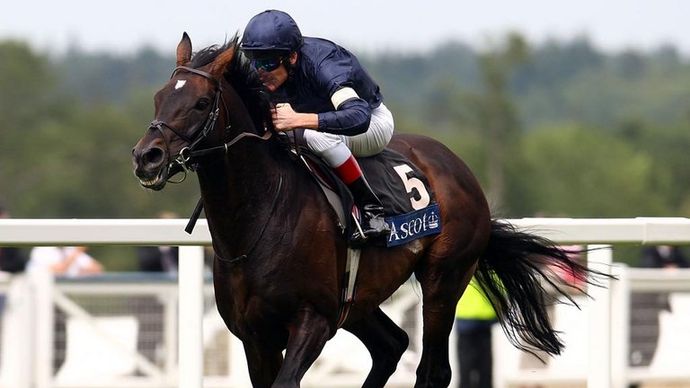
EC: Who's the best horse you’ve seen?
JM: I think it was Sea The Stars. (Ed – better than Frankel?). I’d have loved to see the two race each other. If Mick Kinane could’ve got behind Tom Queally and got his boot a furlong and a half down I think it would’ve been a great battle. What Frankel did in the English Guineas, I’ve never seen the likes of it, he was so far clear, it was over after two furlongs. But Sea The Stars won six Group Ones, Kinane rode him well, he just did enough to win all the time, it would’ve been one hell of a race.
EC: You mention Kinane there, which jockey have you most admired over the years?
JM: I started riding in 1986 and I remember getting a video of the Maktoums and Steve Cauthen was riding for Sheikh Mohammed and Walter Swinburn was riding for Maktoum Al Maktoum and I watched the Maktoums season. Between those two, Cauthen was class, brilliant on the front end, didn’t do too much on them, whereas Swinburn had silky hands, nothing seemed to pull on him, they were the two jockeys as a 16-year-old I was thinking ‘that’s who I want to be like’. When I started riding in Ireland I was up against Mick Kinane and he was the next one, I was thinking ‘if I want to get to the top, this is the guy I’m going to be competing against every day.’ Then later on you had the likes of Pat Smullen coming along.
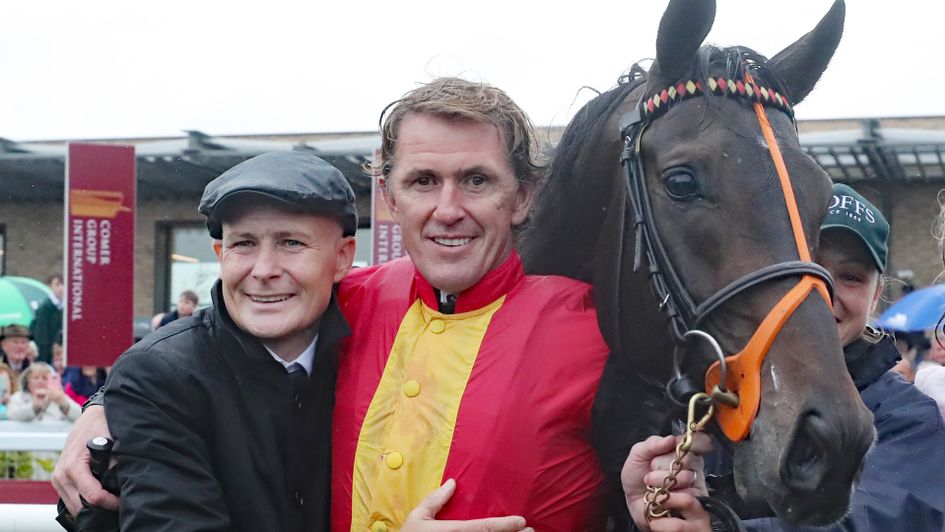
EC: When we reunited you and Pat Smullen at Chester we had a great laugh and you seemed to be inspired by how he dealt with what he’s had to go through?
JM: He always was a real gentleman. A real steely, say nothing, competitor, but when he’s out of the saddle he’s great and it was a good trip down memory lane. We were a lot friendlier then than we would’ve been a couple of years before that!
EC: And what about the guys riding now, are there any at that sort of level?
JM: Ryan Moore is setting the standard at the moment, he’s the main man. He has James Doyle, William Buick, Oisin Murphy who made the step up when becoming champion, just behind him, but one jockey I’m really excited about is Tom Marquand. I can’t wait to see him. He’s had a very good winter in Australia and he reminds me of a young Ryan Moore. He seems strong, he seems stylish and he’s one I’ll be keeping a close eye on. I also have to give a mention to Ben Curtis after what he did on the all-weather in the winter. He’s not the most natural of riders, but he’s not afraid to work and he’s improved 100 per cent. Winning, getting on the right horses, helps along the way, but to do that you have to put in the hard work and there’s no doubt Ben Curtis has put in a lot of work this year on the all-weather.
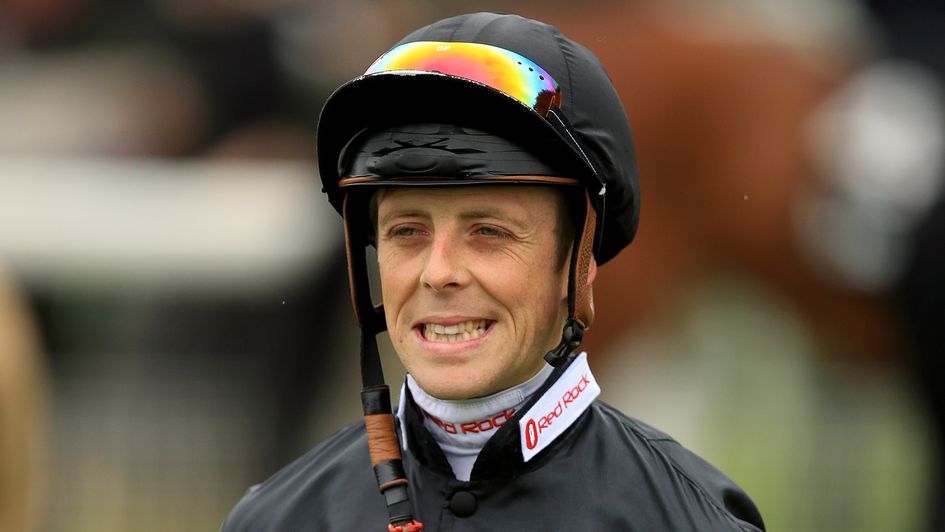
EC: Tough question now. Is there one ride that still wakes you up in the middle of the night that you’d just love to have another go at?
JM: I saw it on Twitter the other day. Six Perfections in the Irish 1000 Guineas. She was beaten in the English Guineas when a French jockey rode her, and so they said they were after a top Irish jockey for the Irish Guineas. So I rode her in Ireland and got boxed in in an eight-runner race and finished second. I watched it the other day and it was still painful!
EC: You finished riding, how difficult was it to make the transition from Johnny Murtagh the great jockey to Johnny Murtagh the trainer?
JM: It wasn’t too difficult, as in my last year I was training and riding. It’s much the same, you get up early in the morning, look after the horses, the main thing is you have the last call on everything, all the decisions. It’s easy to get the horses fit here at the Curragh. We can gallop them up hills, we can do everything with them, it’s just knowing when to get them up for that big race and knowing your horses. Even as a jockey, I didn’t realise how fit they had to be. It’s very competitive in Ireland and you will not get away with going to the races 90 per cent fit, you have to be 100 per cent fit every time you turn up. The best part of the job is when you pick a race out three weeks in advance and then you work a horse up to that and everything is good and you win the race. I’d say it’s much more satisfying having a winner as a trainer than it is as a jockey. You feel like you’ve done everything from day one.
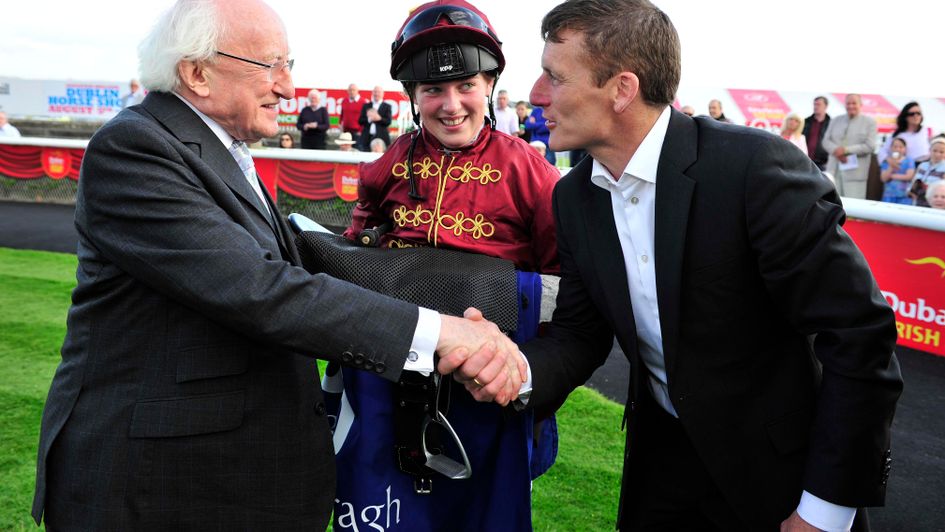
EC: But even as a jockey you’ll have suggested races for horses in three weeks’ time, so that’s always been in your blood hasn’t it?
JM: It was, but I must’ve driven trainers mad. I wouldn’t like Johnny Murtagh riding for me at the moment, I can only imagine how the trainers were feeling at the time. I used to ride out at the yard and get the calendar on a Friday and a race might catch my eye and I’d say ‘there’s a race in a couple of weeks for that fellow’ so it was always in my mind. I was always telling Ger Lyons how easy his job was so he keeps reminding me now – ‘is it still easy?!’
EC: The powerhouses are dominating in jumps racing when you think of Mullins and Elliott in Ireland and the big trainers in England – how difficult is it to compete on the Flat, particularly with another O’Brien coming into the equation now?
JM: It’s like every business, you get the Aldis and the Lidls and they sweep up everything. Other shops are getting wiped out as they can’t compete and it is a numbers game. You can have 300 horses and you have 300 chances, whereas we’ve got 50 horses and 50 chances, they can win two, three, four in every race and not care who wins. So it is very difficult, but you’re hopeful you can attract one of the big owners and just one good horse can carry the whole stable. But it is difficult. One guy said to me ‘Johnny, you have to be very big or very small as in the middle it’s difficult.’ And that’s where we are, in the middle, but we’re hoping to get bigger. Nobody said it was going to be easy, but you have to enjoy those days where it does come off and you beat the big guys.
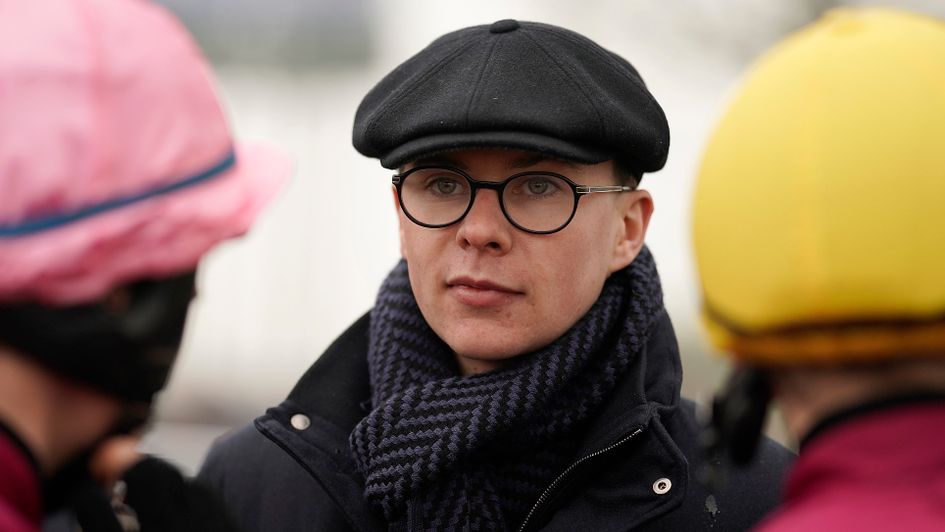
EC: You say training is difficult, but how difficult was it to make the transition and become a pundit on ITV Racing?
JM: It was no problem to me, Ed, I was always a good talker. I’m not bad at reading a race so I can see what happens, I know what the jockeys are going through, I know what trainers are going through. And I had a good front man. He was pitching the ball to me and I was knocking them out of the park. Jason Weaver pulls me out of the crap so much, as when I get stuck on one of those six-furlong handicaps at York that I haven’t even looked at, he’s sharp, he knows the form, he knows by my face I’m struggling, so he jumps in and gives me a hand.
EC: You’ve just said how much preparation you do as a trainer, how much homework do you ahead of an appearance on television?
JM: Not much, Ed. I think I’m better off the bat when it just happens in front of me! Before I used to watch racing morning, noon and night and it just consumed me, now I watch the big races and sometimes I think I’m not up to speed, but on a big day, those big races, they were always the easiest races to ride in. You knew the jockeys, knew the form and it’s a bit like that doing TV.
2010 - @Ascot - Wokingham Stakes - Laddies Poker Two - @JohnnyMurtagh @JeremyNoseda pic.twitter.com/NMLsTyVHE7
— The History of Horse Racing 🏇🏻 🎥 (@roar1968) April 14, 2020
EC: And just a word on Jason Weaver, who doesn’t get much love as a pundit. I’ve made no secret of the fact he’s one of the best I’ve worked with – how have you found working with him?
JM: He’s very sharp and when you look at the homework he puts in, a lot of effort, and he’s witty, not afraid to say what he thinks on the day and that’s all you can ask for. He tips winners, too, and that’s what the punters at home want. His work with Luke Harvey is great, they bounce off each other, and I think they’ve a huge following in both England and Ireland. He doesn’t mind being wrong, which is always good as well.
EC: Just to finish with, Johnny, what else do you do to relax at home?
JM: I love playing a round of golf. 15 handicapper, playing okay, not playing much at the moment. My other love is gaelic football, I’m a coach for my daughter’s team so twice a week we’re training. I rang Sir Alex Ferguson before I took the job, having ridden Rock Of Gibraltar, and I asked him how I should coach the girls and he goes ‘hard but fair’. So that’s what I’m like – hard but fair! I’m like Antonio Conte on the touchline. We had a good season, we won the under-15s league and under 16s league so the girls are great, my two daughters play, we’re a small little club but it’s great craic and it’s nice to create that. I try and create a siege mentality and it’s all about encouraging them. Make them believe they’re the best in the county – and that’s the way they’ve been playing.
Big thanks to @curraghrace and training grounds for deferring gallops fees for month of April for owners #keepingtheshowontheroad
— Johnny Murtagh (@JohnnyMurtagh) April 8, 2020
EC: And I’m sure, like everyone at Sporting Life, you’re thinking of the NHS workers at the moment while this terrible pandemic has stopped all of our daily lives?
JM: It is terrible times at the moment with people dying, which is horrible, but I do believe something good will come out of this down the line. I believe racing will go in a different direction. It will have to be more open, everybody has to make a huge effort to promote the sport. Whereas before it was maybe a bit secretive. This time with no racing, everyone needs to take stock and think about the bigger picture. Protect it and sell it in the right way. It's only when it’s taken away you realise how much you miss it and how much you love it.
And, of course, I can’t imagine a harder job at the moment, going in for long hours, sick people dying around them. We have to appreciate them and stand back and say thank you.






